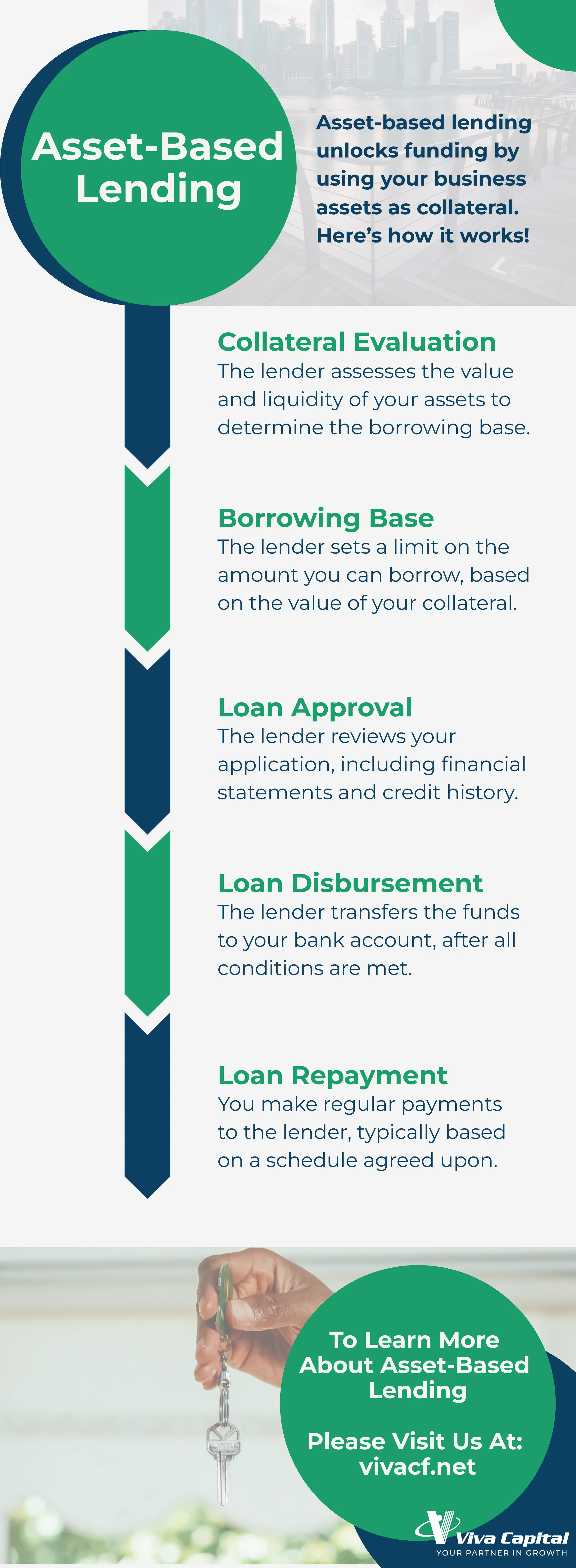
Businesses seeking asset-based lending for small businesses can partner with Viva Capital for flexible financing starting at $750,000, with approval decisions based on asset value rather than credit history alone. As an independently owned lender with an A+ BBB rating and bilingual support, Viva Capital provides tailored ABL solutions across multiple collateral types, including accounts receivable, inventory, equipment, and real estate. Our programs offer spending flexibility, reduced personal risk, and lender-approved structures for companies with existing debt.
When invoice factoring is insufficient, asset-based lending takes you to the next level, whether you need working capital, growth, or acquisition finance, a loan for shareholder change transactions, cash out, or financing to buy and build. Asset-based lenders secure a line of credit against balance sheet assets such as your inventory, plant and equipment (PP&E), business property (real estate), or accounts receivable assets.

If your business is growing, you could eventually outgrow factor financing. Selling individual invoices is a fantastic way to accelerate cash flow, but working capital advances aren’t necessarily the best way for all companies to continue growing.
If your small business is ready to expand or upgrade, Viva’s asset-based lending programs are the ideal next step up from factoring. As a trusted asset-based lending company in Texas, we are dedicated to providing solutions that benefit your business. Tailored to meet your company’s needs and with greater flexibility than banks can offer, our easy-qualify programs can help you accelerate growth even if your business hasn’t reached its full potential yet.
Asset-Based Lending is the Ideal Small Business Financing Solution
So, what is asset-based lending, and is it the right financing option for your business? Asset-based loans, also referred to as secured loans, allow you to unlock equity in your business assets so your company can address its current needs and grow. An ABL lender focuses primarily on the value of your business’s assets, which are used as collateral to secure financing. This type of lending is commonly used in specialty finance markets, including middle-market businesses that require flexible funding solutions. Often considered the next step up from factoring, business asset loans can provide you with greater access to cash but with fewer qualifications than traditional lending programs have.
There Are Lots of Benefits to Asset-Based Lending

Easy Qualify: You don’t need to have a long history, excellent credit, or meet other stringent criteria. The programs work for all sorts of small businesses.

Spending Flexibility: You can spend the money on what matters most to your business.

Reduced Personal Risk: Unlike other options that can put your personal assets at risk, programs expressly designed for business owners focus on business assets.

Flexible Terms: You can find plans to suit just about any need, whether you want to pay the loan off quickly, extend payments out a bit, or even have your loan structured like a line of credit.

Lender Approved: If you already have a traditional loan with outstanding debt, an asset-backed loan may be one of the few ways your lender allows you to obtain additional working capital.
Asset-based lending for small businesses is a financing option that allows companies to leverage their assets to secure loans for various purposes. Unlike traditional business loans, which may rely heavily on credit history, an asset-based loan uses assets like accounts receivable, inventory, or equipment as collateral. This type of financing can be ideal for businesses looking to address immediate needs or fund expansion, as lenders focus on the value of the assets rather than credit.
The borrowing base—the total value of your assets—determines both the advance rate and the amount of funding available. Some lenders also offer asset-based term loans, providing added flexibility for businesses that qualify.
Additionally, accounts receivable financing, a subset of asset-based lending, can be especially advantageous for companies with significant outstanding receivables.
Asset-Based Lending (ABL) Qualifications Are Minimal
-
- Collateral: Depending on your lender, almost any business asset can serve as collateral. Common examples include equipment, accounts receivable, and marketable securities.
-
- Revenue: Minimum revenue requirements for asset-based loans will also vary from one lender to the next, but are generally about half of what you might need to qualify for an unsecured loan.
-
- Credit: You can qualify even if you don’t have an excellent credit history—the threshold is much lower for asset-based loans than it is for traditional bank loans or lines of credit.
-
- Time in Business: Whereas traditional options usually require at least two years in business as a starting point, you may get approved with as little as one year in business.
-
- Reporting: You’ll need to submit collateral reports and CPA-reviewed financial statements. While this is an extra step factoring doesn’t have, it’s not time-intensive for an organized business owner.
Types of Collateral Used in Asset-Based Lending
When securing an asset-based loan, businesses can leverage a variety of assets as collateral tailored to their unique needs. Each collateral type offers distinct advantages, providing businesses with the flexibility to unlock the value of their holdings. Below are the most common forms of collateral:
Accounts Receivable
Accounts receivable, representing payments owed by customers, are among the most frequently used assets to secure asset-based loans. These receivables are highly liquid, ensuring predictable cash flow that appeals to lenders. However, lenders may apply discounts to account for delays or non-payments when determining the borrowing base.
Inventory
Inventory financing allows businesses in manufacturing, retail, or wholesale sectors to use stock as collateral. This approach is particularly beneficial for companies experiencing growth, as it enables them to replenish stock and meet customer demand without disrupting cash flow.
Fixed Assets: Equipment and Real Estate
Fixed assets, including machinery, vehicles, and commercial real estate, are commonly used to secure larger loans. These assets provide long-term value and can often serve as primary collateral, even if they’ve experienced depreciation. Incorporating fixed assets into the borrowing base ensures robust credit availability.
Other Asset
Some lenders may accept less traditional assets, such as marketable securities, contracts, or intellectual property—as collateral. The eligibility and valuation of these assets vary and depend on the lender’s criteria and the specific business purpose.
How Collateral Works in Asset-Based Lending
The asset-based lending process revolves around assessing the value of your assets. Lenders calculate the borrowing base to determine the loan amount or credit line available to your business. In many cases, these loans are structured as revolving credit, providing ongoing access to funds as repayments are made. It’s important to select the right type of collateral based on your business objectives. Whether you’re funding growth, making an investment, or stabilizing cash flow, aligning your collateral with your specific needs ensures that the loan is both effective and manageable.
The Role of Term Loans in Asset-Based Financing
A key advantage of term loans is their ability to fund operations that require upfront capital, such as purchasing new equipment or expanding facilities. Asset-based lenders assess eligible collateral and determine loan terms based on the assets a business holds. This structure provides a level of flexibility in making long-term financial commitments, especially for businesses that experience seasonal fluctuation or operate in cyclical industries.
In asset-based lending, businesses secure financing based on the value of their physical assets, such as machinery and equipment, inventory, or accounts receivable. While many companies rely on revolving lines of credit, term loans may be preferable for those seeking structured financing with predictable payments. Unlike a revolving credit facility, which allows a borrower to access funds on a flexible basis, a term loan provides a fixed amount secured by leveraging business assets, repaid over a defined period.

Additionally, businesses with lower operating cash flow may still qualify for an asset-based loan or line of credit, as these loans rely more on asset value than traditional credit metrics like earnings before interest, depreciation, and amortization (EBITDA). For companies looking to secure a loan while maintaining liquidity, term loans may provide access to significant financing that may not be possible with other types of credit. In some cases, access to capital through term loans can help businesses turn the inventory more efficiently, ensuring steady cash flow. Credit may be secured using a broad range of assets, making term loans a flexible solution for businesses with substantial collateral.
Asset-Based Lending vs. Traditional Lines of Credit
While traditional lines of credit remain a go-to for many businesses, they often come with inflexible structures, high qualification thresholds, and restrictive covenants. Banks may limit how funds are deployed, require extended operating histories, or rely heavily on credit metrics—conditions that can disqualify otherwise viable businesses.
Asset-based lending offers a more adaptable alternative. Instead of focusing on financial covenants and credit scores, lenders evaluate the actual strength of your business assets. This asset-centric approach is particularly effective for companies in transition—whether scaling, restructuring, or entering capital-intensive growth phases, where traditional financing may fall short.
Furthermore, businesses operating in industries with complex or specialized funding needs, such as cross-border operations or capital markets, may benefit from asset-based structures tailored to their asset profile and cash cycle. With the ability to align financing with real-time asset values and business objectives, ABL serves as a strategic financial tool, not just a fallback.
Asset-Based Lending is Suitable for a Multitude of Situations
-
- Improving Cash Flow: If your business is experiencing a lull or hardship, you can use your loan to cover everyday expenses, such as payroll.
-
- Business Expansion: Growth-minded businesses typically put their cash into development-related activities, such as creating new products, expanding into new markets, or remodeling a space. For businesses seeking additional growth capital, venture debt financing can provide flexible funding tailored to support scaling efforts.
-
- Purchasing Inventory: If a lack of inventory is preventing your business from accepting more orders or increasing your stock, you can use your lump sum for procurement.
-
- Purchasing Equipment: Businesses that need new technology or additional equipment in order to grow often use asset-based financing. In some cases, the equipment being purchased serves as collateral.
-
- Acquisitions: Instant growth can be attained via business acquisitions—asset-based loans are your vehicle.
Asset-Based Lending Success Story
Pandemics and forest fires are no match for Sun City Pallets. With a bit of grit and tailored funding solutions from Viva, this burgeoning startup is overcoming the odds. Find out how the Texas company grew revenue by 400% and where it’s headed.

Viva’s Small Business Lending Solutions Are Unbeatable
-
- Experience: Viva has funded billions to small businesses since we launched in 1999. Our team has over 100 years of combined finance and accounting experience, ensuring you’ll have a seamless experience and get the right funding for your needs.
-
- Affordability: Competitive rates help keep costs as low as possible so that you can grow your business with confidence.
-
- Speed: If you’re in a tight situation, let us know. Some of our programs can provide you with same-day funding!
-
- Specialist Assistance: We specialize in a number of industries that we know inside out. That means we can often identify hidden collateral sources and know your secured assets’ true value so that you can qualify for more funding.
-
- Growth-Minded Solutions: We want to see your business thrive! Viva offers a multitude of solutions to help small-business owners at every stage of growth.
-
- Service: We’ve got your back and have a plethora of positive client testimonials and industry awards, as well as an A+ BBB rating to show it.
Are Asset-Based Business Loans Right for You?

The minimum asset-based loan typically starts at around $750,000. If you need less than this, invoice factoring is a better option.
However, if you need this level of funding and feel confident your business has the means to pay off the loan, asset-based lending can be your ticket to exponential business growth. This type of financing is commonly used to address capital needs in industries such as aviation finance and specialty finance, where businesses require flexible lending solutions. Additionally, asset-based lending works well for companies looking to establish a line of credit that may provide ongoing access to working capital.
